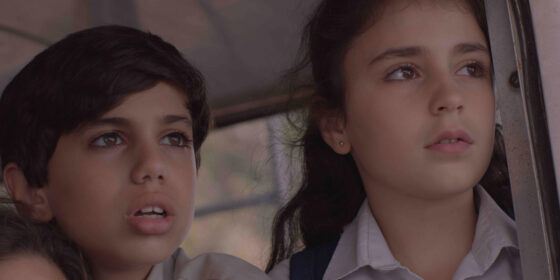1982 (Oualid Mouaness, US/Lebanon/Norway/Qatar) — Discovery

By Mark Asch
Surely autobiographical, fortysomething Lebanese writer-director Oualid Mouaness’ debut fiction feature 1982 views the Israeli invasion into the then civil-warring nation from the unlikely, ultimately unpropitious vantage of an English-language private school in East Beirut at the end of the school year. Fifth-grader Wassim (Mohamad Dalli) scrambles to finish his exams and muster the courage to confess his love to the smartest girl in class, Joanna (Gia Madi), before the bombs fall, in a lower-stakes, very pre-Son of Saul conflation of personal passion and world-historical trauma.
For 50 minutes, the film is mostly a middle-school rom-dram, with misunderstandings, his-and-hers best friends (a chunky oversharer and a prudish gossip), and grave, expository dialogue for the basically serviceable child actors. The school campus which is the film’s near-sole location is a memory palace, with lovingly period world maps on the wall and dusty playground soccer pitches but shot with bright-’n-tidy, frosted-glass cinematography and weaponized with a placid, anticipatory style that’s all skyward-watching camera, too-quiet pillow shots, or Van Santian shallow focus, set to tinkly music or non-diegetic-or-is-it rumble and hum. The long-foreshadowed Loss of Innocence comes when a crescendo of proto-pubescent angst is interrupted by a tank convoy rolling by.
As Wassim and Joanna’s teacher Ms. Yasmine, Caramel and Capernum director Nadine Labaki (replete with kohl-smoky eye makeup and long hair) is a worldly, weary embodiment of a child’s awed idea of adulthood: glamorous, distracted, sometimes stormy-terse and sometimes offering a voluptuously wry flicker of indulgence (Mouaness makes Wassim a budding cartoonist, whose superhero drawings are admired by adults and incorporated into semi-animated interludes). But though shot through door frames, Yasmine is perceived more by the camera than by the children, and is saddled with her own star-crossed love for a fellow teacher whose political convictions put him at odds with her Christian Phalangist militiaman brother. (Sample dialogue: “You both think you’re right.”)
In the best sequence in the movie, Yasmine tries to proctor a math exam as the attacks in the south of the country intensify and draw nearer, her classroom-management skills taxed beyond their limits as the audio track mingles the sound of scratching pencils and far-off (and then not-far-off) bombs, and parents barge in to pull their kids out of school. Mouaness sustains this momentum for much of the second half, riding along the crest of a high-tension early-release day with a logjam of buses and parents outside, unreliable attendance sheets, and the school secretary working the phones like a champ. Despite Mouaness’ switch to a war zone-appropriate handheld camera and frequent hoary character bits, the sense of tumult tearing at the scaffolding of a school day, shot through with constantly updated radio bulletins, will have a familiar feel to viewers who were K-12 on 9/11. 1982 sustains this momentum until a spectacularly misconceived ending in which Mouaness reaches for lyricism and uses war-torn Beirut as the greenscreen backdrop for a magic-realist sequence that validates the romantic fantasies and artistic aspirations of his 11-year-old stand-in.
Mark Asch- « Previous
- 1
- 2


